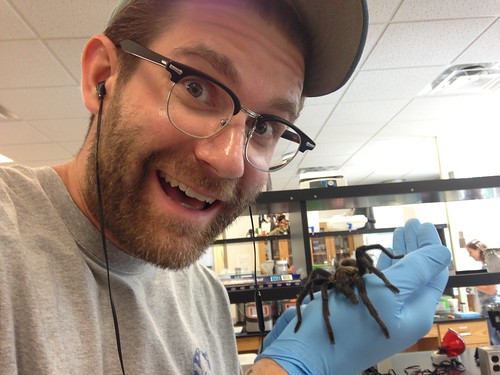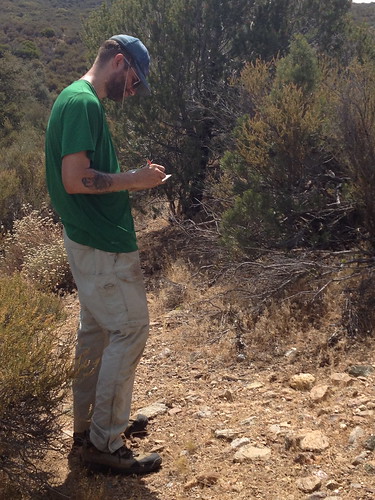Auburn University biologist discovers new tarantula species, names it after Johnny Cash
Article body
A team of researchers, led by Chris Hamilton, former doctoral student in the Department of Biological Sciences at Auburn University, has discovered a previously unknown species of tarantula and named it after legendary singer-songwriter Johnny Cash.
The species, Aphonopelma johnnycashi, was found in California near the site of Folsom State Prison, which Cash made famous in his song "Folsom Prison Blues." The mature male Aphonopelma johnnycashi measures up to 6 inches across and is generally solid black in color, much like Cash's distinctive style of dress from which his nickname, "The Man in Black," was coined.
The discovery was made during a study recently published by ZooKeys, a journal that features biodiversity research.
Along with the Aphonopelma johnnycashi, Hamilton's study determined there are only 29 species of tarantula in the United States, 14 of which are new to science. Researchers had previously identified 55 species. The new descriptions nearly double the number of species known from the American Southwest, a region described as a biodiversity hotspot featuring frigid mountains and scorching deserts.
Because most species of tarantula in the United States are similar in appearance and cannot be distinguished from one another using anatomical features alone, the research team implemented a modern and integrative approach to taxonomy by employing anatomical, behavioral, distributional and genetic data.
The team spent more than a decade searching for tarantulas throughout the American Southwest and studied almost 3,000 specimens, undertaking the most comprehensive taxonomic study ever preformed on a group of tarantulas.
In addition to spider specimens collected by the team, the study also used many specimens gathered from museum collections across the United States, including the Auburn University Museum of Natural History.
"The project was a mix of traditional taxonomy which biologists have been doing for the last 200 years and the most advanced, modern techniques available," said Jason Bond, senior author of the study and chair of the Department of Biological Sciences. "Because of this work, our museum now has the largest collection of North American tarantulas than any other institution in the world."
The study was part of Hamilton's dissertation, which was funded by two National Science Foundation grants made to Auburn University.
"This study represents how Auburn University is producing some of the best trained biology Ph.D. students in the country," said Bond. "Chris is an accomplished field biologist and taxonomist and is also doing cutting-edge genomics research. He was an incredibly bright student and I know he will have excellent career prospects."
Hamilton is currently a postdoctoral researcher at the University of Florida.
Although this is the first time Johnny Cash has been honored by an Auburn researcher, Auburn University professors have garnered national attention in the past for naming celebrities, characters and even President Obama, with a species name.
Bond has named species of trapdoor spiders after U2's Bono, actress Angelina Jolie and talk show host Stephen Colbert, to name a few. Jonathan Armbruster, also of the Department of Biological Sciences, made headlines last year when he named a newly discovered catfish species after the Star Wars fan favorite, Greedo.
Related Media
Media interested in this story can contact Communications Director Preston Sparks at (334) 844-9999 or preston.sparks@auburn.edu.
Auburn University is a nationally ranked land grant institution recognized for its commitment to world-class scholarship, interdisciplinary research with an elite, top-tier Carnegie R1 classification, life-changing outreach with Carnegie’s Community Engagement designation and an undergraduate education experience second to none. Auburn is home to more than 30,000 students, and its faculty and research partners collaborate to develop and deliver meaningful scholarship, science and technology-based advancements that meet pressing regional, national and global needs. Auburn’s commitment to active student engagement, professional success and public/private partnership drives a growing reputation for outreach and extension that delivers broad economic, health and societal impact.







